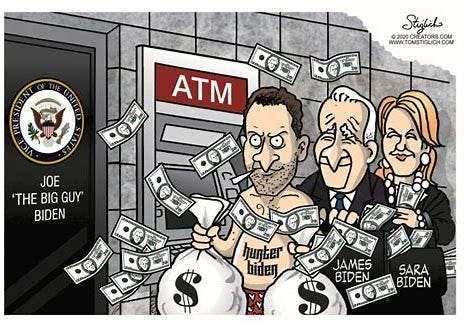The W.C. Weekend Dispatch
Newsletter - Edition for July 22nd, 2023
Welcome to this week's edition of The WC Weekly Dispatch.
DISPATCH DIRECTORY
Whistleblowers Fibbing, But White House Sniffing? Quite the Week!
Senate Democrats' Unconstitutional Scheme to Undermine the Supreme Court
Local: Ohio News
Issue One: Why Ohio Should Vote Yes
As November looms, Ohio finds itself at a pivotal juncture. The spotlight is on Issue 1, a proposal that has stirred passionate debate across the state. The path forward is clear: Ohioans must rally behind Issue 1. Here's an exploration of why this issue is so crucial for the future of our state.
The constitution of Ohio isn't just a document; it's the bedrock of our governance, a testament to our values and principles. Any changes to this revered text should be made with utmost care and consideration. This is where Issue 1 comes into play. By proposing to raise the threshold to pass a constitutional amendment from 50% to 60%, it ensures that any alterations to our constitution are backed by a significant majority. This isn't about stifling progress; it's about ensuring that progress is deliberate and widely supported.
Diving deeper into the specifics, the group Created Equal has been at the forefront of the campaign for Issue 1. Their stance is rooted in the belief that decisions on abortion laws should be the domain of state legislatures. These elected bodies, with representatives from diverse constituencies, are best equipped to debate and decide on such intricate matters. Resorting to constitutional amendments can sometimes bypass this essential dialogue, leading to decisions that might lack the necessary depth and scrutiny.
Another pressing concern is the influence of big money in shaping public opinion. The upcoming abortion rights amendment in November, backed by significant financial muscle, could potentially pass with a slender majority. Issue 1 acts as a bulwark against such scenarios. By setting a 60% threshold, it ensures that financial clout alone cannot dictate the course of our constitution. Genuine, widespread support becomes paramount.
The timing of the August election for Issue 1 has been a point of contention. Detractors view it as a tactical move to set the stage favorably before the November vote. However, as Rep. Jim Hoops points out, the expected high turnout in August is indicative of the genuine interest Ohioans have in this matter. It's not just about strategy; it's about giving the people a voice in defining the rules before the next significant decision.
Furthermore, Issue 1 has implications that transcend party lines. As Rep. Hoops emphasizes, this proposal will shape future amendments, some of which both parties might rally behind or oppose. By necessitating a 60% majority, Issue 1 fosters an environment of cooperation and consensus-building. In these polarized times, such a move could be a beacon of unity.
Rep. Allison Russo's concerns about the sanctity of the current constitution and the judicious nature of Ohio's voters are indeed valid. However, with the increasing influence of big money in politics, there's a genuine risk of the scales being unduly tipped. Issue 1 seeks to balance this, not by curtailing the rights of citizens but by ensuring decisions are made with a broader consensus.
In essence, Issue 1 is more than just a proposal; it's a reflection of how Ohio envisions its future. It's about preserving the sanctity of our constitution, fostering dialogue, and ensuring that significant decisions are backed by a robust majority. For all Ohioans who value the principles of deliberation and consensus, this is the moment to stand firm. Let's champion Issue 1 and chart a thoughtful path forward for our beloved state.
Articles Referenced:
[Anti-Abortion Group Visits seeking support for Issue 1, AVERY KREEMER, - Springfield News & Sun]
* Return To Directory *
Ohio's Stance Against Corruption: A Reminder of Justice
In recent times, Ohio has been at the epicenter of a significant corruption case that has sent shockwaves through the political landscape. The state's unwavering commitment to rooting out corruption and ensuring justice is served has been commendable, setting a precedent for other states to follow.
The Householder corruption case, as spearheaded by U.S. Attorney Kenneth Parker, has been a testament to the state's dedication to upholding the rule of law. While Parker has remained tight-lipped about the next steps, the outcomes so far speak volumes. Householder and Borges, two central figures in the case, were not only convicted but also handed the maximum sentences. This move underscores the prosecutors' commitment to ensuring that those involved in corrupt practices face the full weight of the law.
The case's intricacies further highlight the depth of the corruption. Two other co-defendants opted to plead guilty, while another tragically took his own life before the trial could commence. FirstEnergy, a major player in the scandal, admitted to its role in bribing both Householder and Randazzo. In a bid to cooperate and make amends, the company paid a staggering fine of $230 million. This move, coupled with the firing of several executives and a reshuffling of the board, indicates FirstEnergy's attempt to course-correct. However, it's worth noting that no company officials have faced charges as of yet.
The trial evidence suggests that the investigators are far from done. While FirstEnergy executives have been named as co-conspirators, they haven't been charged, and Randazzo continues to deny any wrongdoing. The case's progression sends a clear message to the public and political figures alike: Ohio's prosecutors are determined to root out public corruption, no matter how deeply it's entrenched.
Parker's recent statements further emphasize this commitment. Drawing a parallel between Householder's sentence and that of a convicted Chinese spy, he underscores that corruption remains a top priority for his office. The willingness to delve into complex corruption cases, even if the investigations span years, is a testament to the state's dedication to justice.
In conclusion, Ohio's handling of the Householder corruption case is a beacon of hope in an era where public trust in institutions is waning. The state's unwavering commitment to justice, transparency, and rooting out corruption serves as a model for others to emulate. It's a clear message to those in power: corruption will not be tolerated, and justice, no matter how long it takes, will prevail.
Article Referenced:
[Convictions not end of Ohio bribery case, district attorney says, Laura A. Bischoff - The Columbus Dispatch]
* Return To Directory *
Bracket Freeze or Financial Thaw? Ohio's Taxing Debate
Ohio is poised for a financial transition with its new state budget, which promises reduced income tax rates, drawing both applause and skepticism. The budget's key change is the decision not to adjust tax brackets for inflation in 2023-2024. This could mean some low and middle-income Ohioans might pay slightly more taxes. However, the budget also offers a collective $1.87 billion tax cut over two years, offsetting potential inflation-related impacts.
The proposed tax cuts range from 0.015% for those earning $26k-$46k to 0.476% for the $46k-$92k bracket. Despite this year's break from Ohio's tradition of annual inflation adjustments, state legislators argue it's not a general tax increase. The debate persists, with focus on potential future adjustments to the bracket freeze.
Article Referenced:
"CLOSER LOOK Middle-class Ohioans could pay more under tax cut" JEREMY PELZER ADVANCE OHIO MEDIA
* Return To Directory *
National American Headlines:
Whistleblowers Fibbing, But White House Sniffing? Quite the Week!
In what can only be described as a brazen display of audacity, recent events unfolding around the White House seem to suggest that the administration believes Americans can be easily hoodwinked. These events, more fitting for a political theater than real-life headlines, have crafted a singular narrative of corruption and deceit that looms large over the White House. The sheer boldness of these developments begs the question: Does the administration truly think the American public will overlook such glaring signs of impropriety without demanding answers?
The story began with a revelation that sent shockwaves across the nation: a bag of cocaine was discovered within the hallowed halls of the White House. This isn't just any building but a fortress known for its unparalleled security. The discovery wasn't in some overlooked nook but in a compartment of the West Wing, the epicenter of American executive power. The Secret Service's subsequent decision to close its investigation without identifying a suspect has left many in disbelief. To think that someone could nonchalantly leave behind cocaine in such a place is beyond comprehension. And when you factor in Hunter Biden's well-documented history with drugs, including those infamous laptop photos, it's hard not to connect the dots, even if they lead to an uncomfortable truth.
Yet, as the weight of this discovery began to sink in, another bombshell hit. Leading the charge were IRS agents, stepping forward with testimonies that can only be described as deeply unsettling regarding the Hunter Biden tax investigation. Their claims aren't hushed rumors but concrete allegations, pointing directly at interference by the Justice Department. The gravity of their accusations are profound: they suggest the DOJ went as far as tipping off Hunter's legal team about impending searches and deliberately obstructing questions related to Joe Biden. One agent's testimony is particularly striking, noting that the approach to the Hunter Biden case was "very different from any other case in my 14 years at the IRS." This isn't a mere oversight; it's a stark deviation that raises red flags.
Amidst this backdrop, the silence from Attorney General Merrick Garland and Mr. Weiss is deafening. Their lack of response, especially when juxtaposed against the backdrop of the cocaine discovery and these serious allegations, doesn't just raise questions; it screams for clarity and accountability. The American public is left piecing together a narrative that, at every turn, seems to point to a troubling pattern of potential corruption and cover-ups at the very pinnacle of our government.
As the days go by, the narrative becomes even more intricate. The intertwining of these two major events paints a picture that's hard to ignore. The audacity of such actions, taken together, suggests a belief that these matters could be brushed under the rug, that the American public would be too distracted or disinterested to connect the dots. But the truth has a way of shining through, even in the murkiest of waters.
The American people are no strangers to political scandals. History is replete with tales of power plays, backdoor dealings, and hidden agendas. But what sets this apart is the sheer boldness, the audacious belief that such glaring improprieties could go unnoticed or unchallenged. It's as if the administration is testing the waters, gauging just how much they can get away with before the tide of public opinion turns against them.
The media's role in all of this cannot be understated. While some outlets have pursued these stories with the tenacity they deserve, others have been noticeably reticent, clearly acting as political cover for the Bidens. But in an era where information is at everyone's fingertips, where every citizen can be a journalist and every voice can be heard, it's harder than ever to keep such stories contained.
The onus now falls on the institutions that have long been the pillars of American democracy. The checks and balances, the oversight committees, the investigative bodies - all must step up to ensure that the truth, no matter how uncomfortable, comes to light. The American public deserves nothing less.
* Return To Directory *
Senate Democrats' Unconstitutional Scheme to Undermine the Supreme Court
The Senate Judiciary Committee is holding hearings on "Supreme Court Ethics Reform" - but make no mistake, this is not about ethics. It is a dangerous scheme by Senate Democrats to delegitimize and control the nation's highest court simply because they dislike recent constitutionally sound rulings.
Led by Senators Sheldon Whitehouse and Dick Durbin, Democrats are pushing legislation to impose congressional ethics rules on the Supreme Court. This would require Justices to follow the exact same disclosure requirements on gifts, income and reimbursements as politicians. It treats judges like elected legislators, not impartial jurists.
The Founders created the judiciary as a separate, independent branch precisely to shield it from political pressure. Yet this bill subjects Justices to the perpetual electioneering environment of Congress. It invites endless harassing ethics complaints for vague reasons like "undermining the Court's integrity."
This is a transparent attempt by Democrats to intimidate Justices they disagree with. The bill also lets judges force their colleagues to recuse themselves from cases based on politicized standards. The goal is hobbling the Court by forcing conservative Justices to the sidelines on a case-by-case basis.
Senators justify this unprecedented attack on judicial independence by citing media stories claiming ethics lapses by conservative Justices. Yet these exaggerated allegations ignore similar financial issues by liberal Justices that drew no scrutiny or calls for reform.
This double standard gives away the game. "Ethics" is merely being weaponized because the Court's conservative majority is restoring constitutional boundaries on issues like abortion, executive power, and religious liberty. Democrats were perfectly content with the Court's supposed "ethics" when they controlled it for decades and used it to impose progressive policies.
Their newfound concern rings hollow. Even Chief Justice John Roberts declined to dignify this scheming by testifying at the hearings. In response, he submitted the Court's already robust ethics rules that voluntarily mirror the Judicial Conference's Code of Conduct in substance.
Unlike politicians, Supreme Court Justices do not have conflicts of interest created by campaign donors or lobbyists seeking specific votes. They simply judge the cases brought before them. Financial ties requiring recusal are rare.
Perhaps hypocritical Senators should recall Congress' actual record on ethics and conflicts of interest before imposing new standards. Their chambers are rife with dubious relationships and backroom dealings. Yet they now seek unconstitutional authority over a separate branch whose record is far cleaner.
In fact, Senator Whitehouse himself once recommended a partisan ally for a federal judgeship. This judge later tried to ban all other judges from joining the conservative Federalist Society in an underhanded attempt at ideological manipulation of the judiciary.
The Senate's hearings are doing immense damage by falsely painting the nation's highest court as unethical and in need of external control. This dangerous deception undermines public faith in the judiciary's legitimacy. In truth, the Court abides by the highest ethical principles, guided only by the Constitution and the law - not the partisan political winds.
If enacted, this legislation would intimidate judges and make them answerable to Congress rather than the Constitution. It violates separation of powers and judicial independence. The Senate has no constitutional authority to dictate rules or oversight to the Supreme Court.
Rather than inventing problems, Senators should be ashamed of abusing their oversight role to bully judges for constitutionally sound rulings they dislike. The Founders are rolling in their graves watching politicians try to subordinate the judiciary's authority to their own. This naked power grab must not stand.
Articles Referenced:
[The Supreme Court Control Act, July 16 - WSJ]
* Return To Directory *
* Return To Directory *
Must See Podcast:
Douglas Murray on Jordan Peterson:
The Adventure of Truth as Existential Elixir | Douglas Murray | EP 376
In an era marked by echo chambers, speaking truth is both revolutionary and essential. This week's podcast spotlights Douglas Murray and Jordan Peterson, exploring the art of truth-telling today.
Peterson highlights the value of poetry, literature, and timeless tales, asserting that they equip individuals with the tools to recognize and advocate for truth, even when it's against the grain.
Murray emphasizes the duty to voice truth, especially when confronted with widespread delusion. This podcast serves as a guide for those aiming to strengthen their voice in today's complex discourse. Join this compelling dialogue on the importance of truth in a misinformation-filled world.







